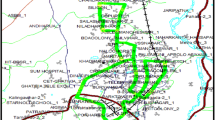Abstract
When the cells in a location area are sequentially paged based on specific information, such as the last registered area or a mobile speed, the paging load may be non-uniformly distributed among the cells. This non-uniform paging traffic causes an additional paging delay due to the increased waiting time in cells that have a high paging load. In this paper, we introduce a new paging strategy in which the paging sequence in a location area is optimized according to both the location probability of a mobile terminal and the paging load distribution among the cells. In addition, we propose a simple polynomial-time heuristic algorithm to determine sub-optimal paging sequence. Numerical results show that our proposed strategy has almost an equivalent optimal performance and outperforms the conventional paging scheme with respect to a paging delay.
Similar content being viewed by others
References
V. Balakrishnan, S. Boyd and S. Balemi, Branch and bound algorithm for com puting the minimum stability degree of parameter-dependent linear systems, Int. J. of Robust and Nonlinear Control 1(4) (1991) 295–317.
P.S. Bhattacharjee, D. Saha and A. Mukherjee, Intelligent paging strategies for third generation personal communication services networks, Journal of Interconnection Networks 1(3) (2000) 153–171.
D.J. Lee and D.H. Cho, On optimum timer value of area and timer-based location registration scheme, IEEE Commun. Lett. 5(4) (2001) 148–150.
S. Mishra and O. K. Tonguz, New metric for analyzing multi-step paging schemes in mobile networks, Proc. IEEE VTC’2001 4 (2001) 2590–2594.
J. Pearl, Heuristics: Intelligent Search Strategies for Computer Problem Solving (Addison-Wesley, 1984).
R. Rezaiifar and A.M. Makowski, From optimal search theory to sequential paging in cellular networks, IEEE J. Select. Areas Commun. 15(7) (1997) 1253–1264.
C. Rose and R. Yates, Ensemble polling strategies for increased paging capacity in mobile communication networks, ACM-Baltzer J. Wireless Networks 3(2) (1997) 159–167.
O.K. Tonguz, S. Mishra and H. Jung, A simple analytical framework for location management in personal communication systems, IEEE Trans. Veh. Technol. 47(2) (1998) 428–439.
W. Wang, I.F. Akyildiz and G.L. Stuber, An optimal paging scheme for minimizing signaling costs under delay bounds, IEEE Commun. Lett. 5(2) (2001) 43–45.
Author information
Authors and Affiliations
Additional information
Dong-Jun Lee received the B.S., M.S., and Ph.D. degrees in electrical engineering from the Korea Advanced Institute of Science and Technology (KAIST), Daejeon, Korea, in 1994, 1996, and 2000, respectively. Since 2000 to 2004, he was with Samsung Electronics Co., Ltd., Korea and participated in developing cdma2000 systems. Since 2005, he has been with Hankuk Aviation University, where he is a professor with School of Electronics, Telecommunications and Computer Engineering. His research interests include radio resource management and location management of 3G and 4G wireless systems.
HyeJeong Lee has received the B.S. and M.S. degrees, both in Electrical and Electronics Engineering from the Korea Advanced Institute of Science and Technology (KAIST), in 2000 and 2002, respectively. She is currently working toward the Ph. D. degree in Electrical Engineering at the KAIST. Her current research interests include mobility and resource management and reverse link performance in the high data rate mobile communication networks.
Dong-Ho Cho received the B.S. degree in Electrical Engineering from the Seoul National University in 1979, and the M.S. and Ph.D. degrees, both in Electrical and Electronics Engineering from the Korea Advanced Institute of Science and Technology (KAIST), in 1981 and 1985, respectively. From 1987 to 1997, he was Professor of Computer Engineering at the Kyunghee University. Since 1998, he has been Professor of Electrical Engineering at KAIST. He is active as a Technical Program Committee and Chair of several conferences, and a reviewer for IEEE journals. He is a Technical Program Committee of the IEEE WCNC 2005 and Globecom 2005. His research interests include 3G/4G wireless communication network, protocol and services.
Rights and permissions
About this article
Cite this article
Lee, DJ., Lee, H. & Cho, DH. Effective Paging Strategy based on Location Probability of Mobile Station and Paging Load Distribution of Base Station in Mobile Communication Networks. Wireless Netw 12, 395–402 (2006). https://doi.org/10.1007/s11276-005-5282-y
Published:
Issue Date:
DOI: https://doi.org/10.1007/s11276-005-5282-y




